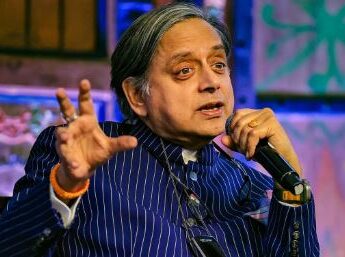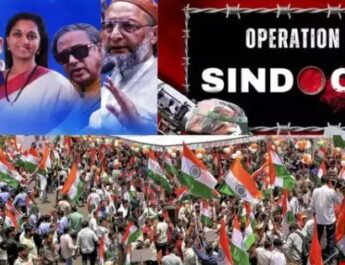New Delhi: The first of the seven multi-party delegations, which will travel to international capitals to articulate India’s position, will leave on Wednesday, armed with a dossier highlighting Pakistan’s decades-long promotion of terrorism and New Delhi’s new normal in tackling cross-border terror after Operation Sindoor.
On Tuesday, Foreign Secretary Vikram Misri provided a briefing to three of the seven delegations regarding key discussion points and global outreach strategies. The briefing was attended by Group Three, led by Janata Dal (United) lawmaker Sanjay Jha, Group Four, led by Shiv Sena leader Shrikant Shinde, and Group Six, led by Dravida Munnetra Kazhagam MP K Kanimozhi, although the latter was absent.
Shinde, the youngest group leader, is scheduled to depart from New Delhi on Wednesday, according to sources familiar with the situation. The briefing lasted over 1.5 hours. Shinde stated, ‘We will convey a clear message that India is a nation that values peace, but we will respond if attacked. Our focus is on economic growth, while Pakistan is engaged in fostering terrorism.’
His group is set to visit the United Arab Emirates, Liberia, the Democratic Republic of Congo, and Sierra Leone. The delegations aim to engage with parliamentarians, ministers, government officials, and think tanks across 33 countries to showcase how India has established a new standard in Operation Sindoor to effectively combat cross-border terrorism.
They will address significant terror incidents linked to Pakistan, highlighting Islamabad’s inaction despite New Delhi’s provision of compelling evidence, including photographs, DNA samples, and call records following the 2008 Mumbai attacks. Furthermore, they will emphasize that major international terror attacks, such as the 9/11 World Trade Center attacks and the 2005 London bombings, have connections to Pakistan. The primary focus will be on the April 22 Pahalgam attack and India’s counter-terrorism response.
Bharatiya Janata Party leader SS Ahluwalia remarked to HT, ‘India has consistently asserted that our struggle is not against the general populace but against terrorists. This principle was reiterated in the UNSC post-9/11. Our operations have targeted only terrorists and their hideouts, avoiding military installations, while Pakistan has retaliated.’
We will address all incidents of terrorism, but it seems lessons are not being learned. We do not seek war, yet we will not accept being forced into one. Our losses are intolerable, and we will target terrorist operations. Should the Pakistani government or military attempt to attack us, we will not remain passive.
Jha, leading a delegation to Indonesia, Malaysia, South Korea, Japan, and Singapore, stated after the meeting, ‘We will inform the world that all global terror incidents are directly or indirectly connected to Pakistan. For 40 years, we have endured terrorism from Pakistan; in 2008, we provided them with all necessary evidence, including DNA samples and call records, but they took no action.
It is akin to asking a thief to investigate their own crime. The time has come to reveal Pakistan’s intentions and communicate to the world that India has adopted a new approach, as PM Narendra Modi has indicated, to combat terrorism sponsored by Pakistan.’ Congress leader Salman Khurshid, the only former external affairs minister in the delegation, told HT, ‘The government’s stance since the Pahalgam attack was reiterated and emphasized on Tuesday. We will clarify the situation regarding the ceasefire and assert that no third party was involved.
The Pakistan DGMO contacted our DGMO expressing a desire for a ceasefire.’ The Union parliamentary affairs ministry announced on Saturday that seven delegations will be led by former Union minister of state Shashi Tharoor; BJP leaders Ravi Shankar Prasad and Baijayant ‘Jay’ Panda; Janata Dal (United) leader Sanjay Jha; Dravida Munnetra Kazhagam’s Kanimozhi Karunanidhi; Nationalist Congress Party (Sharadchandra Pawar) leader Supriya Sule; and Shiv Sena leader Shrikant Shinde. However, the inclusion of certain Opposition leaders without their parties’ explicit approval has led to controversy.
Delegates have been instructed to emphasize that India seeks peace and that military actions, including the air strikes in Balakot following the Pulwama attack and the current Operation Sindoor, are responses to terrorist threats linked to groups in Pakistan. India maintains a strict zero-tolerance stance on terrorism, with Prime Minister Narendra Modi asserting that dialogue cannot coexist with terror, according to a knowledgeable source.
Regarding the Indus Water Treaty, which has been suspended following the April 22 attacks, Misri noted that the treaty’s preamble is founded on ‘goodwill and friendship,’ and water continues to flow to Pakistan. However, a source familiar with the situation remarked that while the preamble emphasizes goodwill, Pakistan’s failure to uphold these relations undermines that sentiment. Misri also highlighted that India has raised concerns about the 1960 water-sharing agreement over the years, citing factors like climate change and demographic shifts.
Patra, a member of Shinde’s team, described the briefing by Foreign Secretary Vikram Misri as highly informative and purposeful, detailing the scope of soft power diplomacy to be employed by Indian all-party delegations. He mentioned that specific talking points would be provided prior to their departure, along with information about the interlocutors they would meet in those countries, with a focus on exposing Pakistan-sponsored terrorism and the implications of Operation Sindoor.




